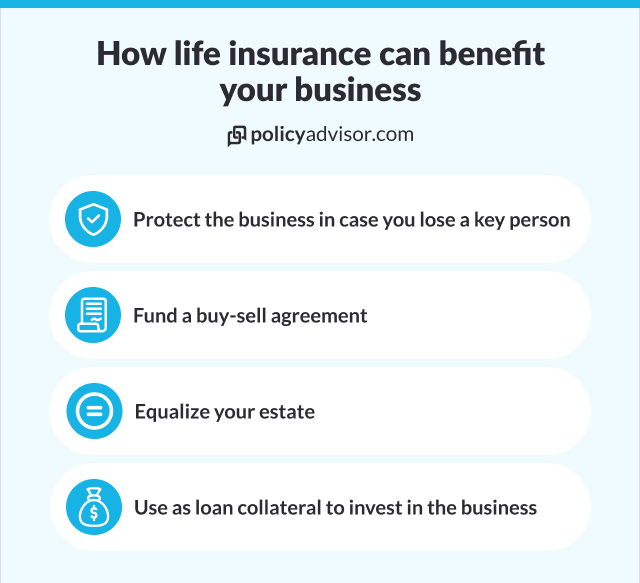A guide to life insurance for business owners in Canada (2024)
Life insurance is an invaluable asset for business owners. It can help ease financial concerns during their lifetime and after they pass away. A policy can be used to help cover taxes after death, to fund a buy-sell agreement, or as collateral for a loan to invest back in the business. The policy can be purchased for an individual owner or key employee, and the business can be named as the beneficiary to receive the death benefit payout.
- What is life insurance for business owners?
- What are the benefits of life insurance for a business owner in Canada?
- What are the different types of life insurance business owners can buy?
- Life insurance strategies for business owners
- How can business owners save on taxes with life insurance?
- How to get life insurance if I’m a business owner?
- Frequently asked questions about life insurance for business owners
Business owners know how important it is to keep your personal and business assets secure. But many don’t realize how crucial life insurance is to their business protection plan.
Keep reading to find out how business owners can use life insurance to their unique advantage, for the benefit of their business and their family.
What is life insurance for business owners?
For business owners, life insurance can be used to meet the financial needs of their business, instead of for strictly personal needs. It offers a reliable way to ensure the legacy you’ve worked hard to establish is protected for the future. A life insurance policy can be leveraged to:
- Ensure business continuity after the death of an owner
- Fund buy-sell agreements
- Secure business loans for expansion or other needs
- Insure against the risk of losing employees who are critical to business operations
- Settle liabilities if the business closes
Can a business own a life insurance policy?
Yes, a business can own a life insurance policy. The business owner or even an important employee can be the covered person, as long as the business has an insurable interest in the individual getting coverage. This is usually called corporate-owned life insurance.
- The business pays premiums
- The business is the beneficiary, and will receive the death benefit payout if the person passes away
- Tax-free funds can go into the business’ capital dividends account
What are the benefits of life insurance for a business owner in Canada?
There is no shortage in the number of ways Canadian business owners can benefit from purchasing life insurance, including:
- Business continuity — Funds from a payout help to keep the business operational in the event of an owner’s death
- Succession planning — Funds can be used to buy out ownership from a deceased owner
- Tax advantages — Tax-free death benefit payouts, tax-free policy loans, and tax-deferred cash value growth, all help owners maximize tax efficiency
- Capital dividend account — Death benefit proceeds can go into a CDA account and be used to pay tax-free dividends to shareholders
- Access to liquidity — Whether through a death benefit, loan, cash value, or dividends, life insurance gives owners multiple ways to access liquidity for their needs
- Facilitating growth — Extra cash and collateral help secure loans or directly fund expansion
- Creditor protection — Death benefit proceeds can cover debts and satisfy creditors, preventing profits from being diminished
- Estate planning — Cover estate taxes and ensure the business and its assets can be passed on with minimal tax burden for heirs
- Streamlined policy management — Coordinate premium payments, update policies, or file claims from a single account
- Premium savings — Equitable sharing of premium payments and benefits through split-cost arrangements helps business owners pay reduced costs
- Premium write-offs — Life insurance premiums paid for by a corporation can be tax-deductible for group life insurance or when the policy is used as loan collateral
What are the different types of life insurance business owners can buy?
Business owners can benefit from both term life insurance and permanent life insurance, depending on their financial needs.
The best type of policy for your business will depend on your unique business needs and how you intend to leverage your policy. You should speak with a licensed insurance advisor if you’re unsure about which policy might be the right one for you.
Life insurance strategies for businesses and owners
Business owners can use life insurance to settle many financial obligations for both personal and business uses. Our experts give guidance on some of the different ways this can be done below.
How can business owners use term life insurance for personal use?
Just like anyone else, a business owner can use a personal life insurance policy to protect their family’s future finances. Their surviving loved ones can use the death benefit to:
- Replace lost income and keep up with the everyday cost of living
- Cover personal debts like mortgages, car loans, credit card debt, or lines of credit
- Pay for children’s future education costs
- Bolster retirement income for a spouse or partner
- Pay for end-of-life expenses and funeral costs
How can business owners use whole life insurance for personal use?
In addition to the benefits for their family after their death, a business owner can also use whole life insurance for financial benefits during their lifetime to:
- Supplement retirement income
- Access cash surrender value for investments, unexpected expenses, or business needs
- Borrow against the policy or use it as collateral to secure a business loan
- Plan to cover future estate taxes or capital gains taxes for their loved ones
How can business owners use life insurance for business use?
There are several unique strategies business owners can use to leverage life insurance for the business’ benefit:
How can businesses save on taxes with life insurance?
There are multiple ways a life insurance policy can have tax advantages for Canadian business owners:
This is one of the most straightforward uses of life insurance. Proceeds are received tax-free, and can then be used for any business needs.
Death benefit proceeds can be allocated to a business’ capital dividend account and used to pay dividends to shareholders. This is a crucial tax advantage for businesses because it allows for tax-free distribution of profits.
Permanent insurance policies build cash value over time, and this growth is tax-deferred. A business owner doesn’t have to pay taxes until money is withdrawn, letting growth build more efficiently until they are ready to use it to support expansion, to invest, or for any other purpose.
Permanent policies also allow you to borrow against the cash value without paying taxes on it. This is called a policy loan, and it can be an advantageous way for a business owner to cover financial needs without the tax implications that can come with accessing funds in other ways.
If a business owner purchases life insurance for employees, those premium costs can be tax-deductible.
A business owner who wants to pass the family business onto an heir can use life insurance to offset the taxes that often come with transfer of assets in Canada.
An IFA allows you to secure permanent life insurance coverage, while retaining access to cash to invest in your income-producing assets or businesses. It can be used as a tax-saving strategy if you use the proceeds to reinvest in your business.
How to get life insurance if I’m a business owner?
The best way to get life insurance as a business owner is to work with an experienced, professional broker like PolicyAdvisor. Let us help you assess the best options for your goals, compare quotes, and give personalized advice.
We can also collaborate with tax lawyers to ensure that your business will be passed down in a tax-efficient manner. Reach out to our experienced advisors let us get you started down the right path for covering yourself and the business you’ve built.
Frequently asked questions about life insurance for business owners
Yes. Business owners need life insurance just like everybody else does. Not only can it help them care for loved ones or financial dependents after they pass away, but it can also help serve their unique business needs.
Determining your life insurance needs for business purposes will vary depending on your business’s unique needs. You should think about how much money would be needed to cover business expenses and liabilities such as:
- Business loans
- Inventory costs
- Costs to replace key employees
- Costs to buy you out of the partnership after death
We also recommend chatting with an expert insurance advisor who can discuss your goals and guide you on how much coverage would be best.
The best policy for your business will depend on your financial goals and details about your business, such as the structure, industry, size, and more. In general:
- Term insurance may be better for small business owners, as it’s more affordable and can cover short-term needs during the early growth years
- Whole life insurance may be better for owners of larger organizations who may have more capital and can better leverage the investment component
But, each situation is different. It’s always best to speak with one of our licensed insurance advisors to make sure you select the policy that would best secure your business.
- Business owners can use life insurance for key financial needs during their lifetime and beyond
- A life insurance policy can give business owners extra protection to compensate for loans, debts, or expenses they've incurred to get their business started
- Life insurance can be purchased in the business name to ensure that the business runs smoothly and without extreme tax implications after death


 1-888-601-9980
1-888-601-9980



